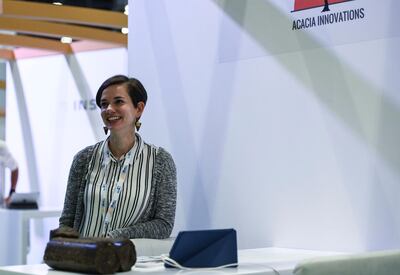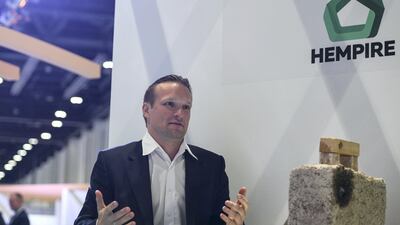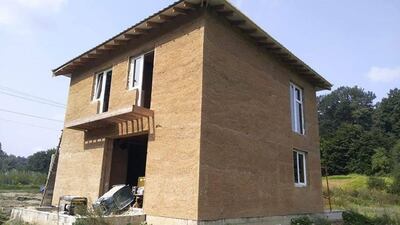Civil engineer Sergiy Kovalenkov worked on construction projects all over the world until one day he realised he was part of the problem.
He abandoned his career and now makes houses out of hemp.
The 35-year-old Ukrainian is one of 100 owners of environmentally friendly start-ups who were flown to the UAE and offered the opportunity to rub shoulders with millionaire investors, ministers and heads of multinational companies at the World Energy Congress.
Also among the green innovators, who were allocated their own section of the exhibition, is a company making a firewood alternative out of sugar cane waste in Kenya, and an entrepreneur bringing solar power to some of the most isolated communities on the Thailand-Myanmar border.
Elsewhere, there is a company developing a self-driving electric lorry and the maker of solar-powered fridges, which can keep vaccines cool in the most remote parts of Africa.
“The construction industry is like a dinosaur,” Mr Kovalenkov said.
"Buildings are being built with the same old materials, still emitting tonnes of carbon into the atmosphere. I realised I was part of the problem, because I never questioned the materials and how they were produced in the traditional construction industry. From part of the problem, I became a headache for traditional insulation materials."
Hempire makes a natural insulation material out of hemp waste materials, which continues to absorb carbon dioxide from the environment after it is installed.
The process means the product, made out of hemp, water and a natural lime-based binding agent, is carbon negative, meaning it takes more carbon dioxide from the atmosphere than making it creates.
The business started in Ukraine but recently opened an office in California. The material is an excellent regulator of humidity and keeps homes cool, Mr Kovalenkov said. He now has an eye to expanding into the Middle East.
“This material doesn’t burn, is not afraid of moisture, it repels pests and has a list of advantages which means it can compete at the highest levels with traditional insulation materials,” he said.

Elsewhere, Elana Laichena promotes her business, Acacia Innovations. Her Kuni Safi briquettes not only help the environment but are also improving the health of people in Kenya, where they are sold as an alternative to firewood. Made from an otherwise useless by-product of the sugar manufacturing process and used mostly for cooking, they emit far less smoke than wood, burn longer, and save trees that would otherwise be cut down for fuel.
Ms Laichena, 29, said: "
It burns similarly to firewood but with almost no smoke, so it’s much healthier for the cooks.”
At the Congress opening ceremony, hundreds of delegates were encouraged to visit the 100 environmentally friendly start-ups, who were given the exhibition space free of charge.
During the four-day event, they will hold pitching sessions, where they will attempt to catch the eye of a potential investor or major customer.
They were selected by organisers because, this year, they made a 100-strong shortlist for the Start Up Energy Transition Awards, a global initiative designed to encourage pioneers who develop green energy solutions.
One such businesswoman is Salinee Hurley, whose company, Sun Sawang, sells affordable solar-powered energy units and lanterns to communities along parts of the Thailand and Myanmar border who are cut off from the energy grid. She develops payment plans which allow customers to spread the cost over five years, making the products affordable compared to the kerosene lamps, candles and generators which many otherwise use for lighting and power.
As well as home systems, with prices starting at the equivalent of $11, she also sells larger units which can power community buildings such as clinics and schools, while local people gain an income after being trained as sales people or technicians. So far, Sun Sawang has installed 300 home systems and sold 2,000 lanterns.
“The candles or kerosene lamps can be dangerous, especially when the houses are made of natural material like bamboo or leaves,” Ms Hurley, 41, said. “It’s not convenient for houses with small kids, who cannot study at night once they start to go to school because of the lack of electricity. And of course, using the solar power instead of diesel generators is good for the environment.”


